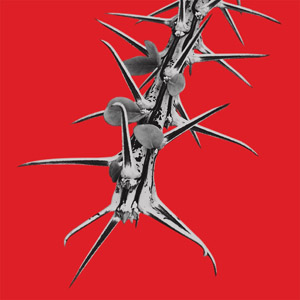Gog
 In some ways, Gog’s new LP comes across as a rebirth of the project that keeps the best elements of Michael Bjella's work while pushing boundaries and expectations. The bleak, moody guitar noise is still there, culled from the best bits of metal and drone, but Gog manages to go further and make music that is challenging, but still memorable as songs, rather than just compositions.
In some ways, Gog’s new LP comes across as a rebirth of the project that keeps the best elements of Michael Bjella's work while pushing boundaries and expectations. The bleak, moody guitar noise is still there, culled from the best bits of metal and drone, but Gog manages to go further and make music that is challenging, but still memorable as songs, rather than just compositions.
The most striking change for me was right on the surface:the cover art.While previous releases have stuck to a dark gray/black palette and more traditionally metal imagery such as skulls and the like, Gog is bright red and stark.Paired with the bold, block yellow lettering on the back, I was reminded of vintage communist propaganda posters, which surely is no accident.
This does not carry over to the music, however, with these five songs not diverging drastically from previous Gog albums, but having an additional layer of complexity and polish.Bjella channels this on "The Lies, They Want to Give You Something," by pairing deep, pounding bass with depressive piano.His penchant for excellent guitar noise is omnipresent and slips in nicely, miraculously drifting into a melodic squall toward the end.
The piano also features prominently on "First Night After Death," within a subtle expanse of ambience and a dull, building guitar roar.With drums provided by Josh Bodnar, it comes together in a bombastic, powerful conclusion that closes the album chillingly well."The First Cure" leads in with the softest moments of the album.Soft electronics and gentle vocals by guest Francesca Marongiu (Agarttha/Architeuthis Rex) set a gentle, haunting stage that are blown away by rapid fire drums and blackened guitar noise, her beautiful voice replaced with Bjella's grindcore growl.
On "Before You Go, We'd Love to Tear You to Fucking Pieces," Bjella is at his most conventional, with grimy, dirgy bass and the pounding drums providing the rhythmic foundation for his droning guitar noise.It might not be as adventurous as some of the other songs here, but it is so well done that it is completely irrelevant.At the other end of the spectrum, "Until the Body Runs Dry" is just a grinding expanse of fuzzy low volume noise.More textural and abstract, it works great as a moody low-key midpoint to the album.
The biggest evolution on this album is Gog's transcending the experimental metal scene and becoming a different, uncategorizable beast.The sound he honed on recent albums is still present, but is fully realized here.It also manages to be memorable, because none of these came across as just excursions in sound or directionless experiments, but instead as actual songs.While they might not be type to sing along to, Michael Bjella's compositional ability cannot be denied.
samples:
 



